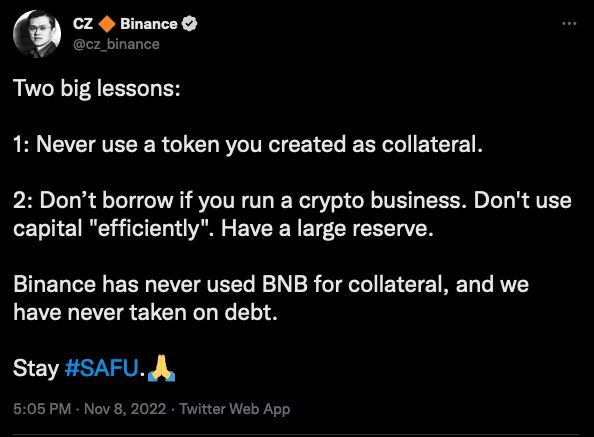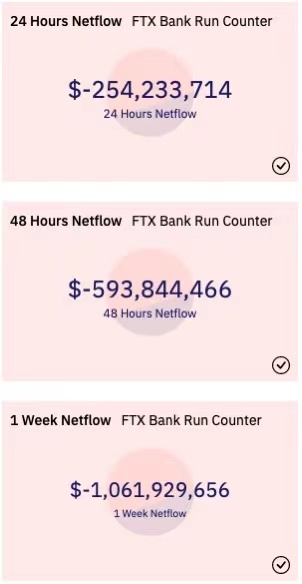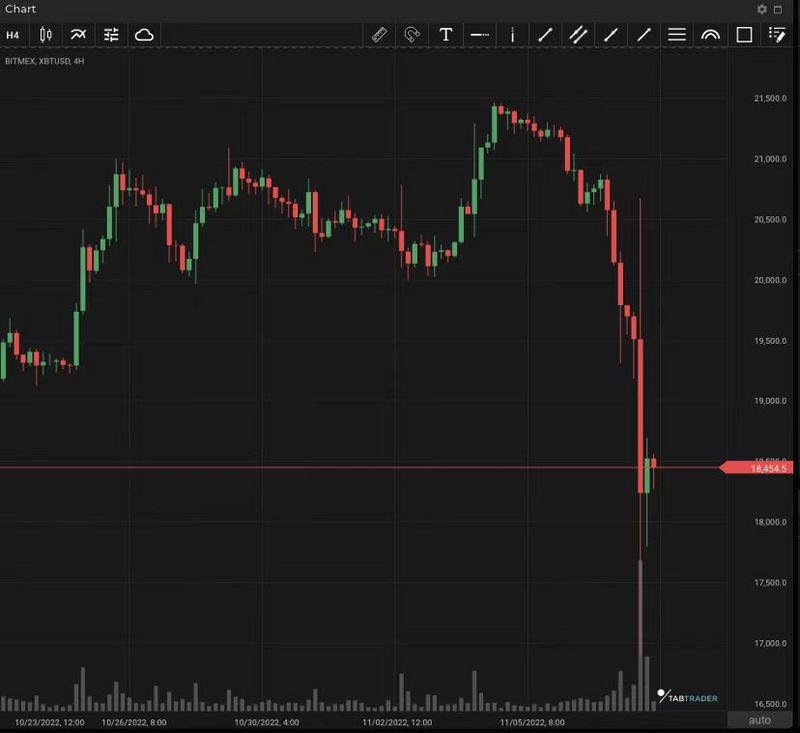Arthur Hayes on the FTX Crisis: The Great Silence Event
Original Title: 《Speechless》
Author: Arthur Hayes
Translation: Katie Gu, Odaily Planet Daily
A few days ago, I asked a question on Twitter: "Who will be the Lehman Brothers of this crypto lending cycle?" Many people said it was FTX, and I just laughed it off. I never believed FTX would collapse. However, in the past few days, we have received news from all sides. The catalyst for its bankruptcy is the same as before: a good company first overextends itself, then uses its continuously rising high valuation as collateral to acquire a large amount of cheap credit. As money becomes expensive, they can no longer hide it. But to be optimistic, I believe the last candle of this cryptocurrency bear market is about to go out, and we will emerge from the bear market.
Event Retrospective
It all began with an article from Coindesk that described the details of a leaked Alameda balance sheet.
Among its $8 billion in liabilities, there are $292 million of "locked FTT" and $7.4 billion in loans. Other significant assets on the balance sheet include $3.37 billion in cryptocurrencies and a large amount of native tokens from the Solana blockchain—$292 million of "unlocked SOL," $863 million of "locked SOL," and $41 million of "SOL collateral." SBF is an early investor in Solana. Other mentioned tokens include SRM (the token from the decentralized exchange Serum co-founded by SBF), MAPS, OXY, and FIDA. Additionally, there are $134 million in cash and equivalents, as well as $2 billion in stock securities investments. Most of the assets on their balance sheet are illiquid FTT tokens and a bunch of junk coins.
Let’s analyze why FTT is so important to the FTX/Alameda empire.
According to the declared tokenomics of FTT, FTX promised to use one-third of all trading fees to buy back FTT. SBF owns most of Alameda's equity, while he continuously dilutes his FTX equity to obtain capital from venture capital firms. A significant portion of FTX's revenue is transferred from FTX to Alameda through the large amount of FTT shares held by Alameda. It is speculated that Alameda received a large allocation of FTT, providing essential market-making services for FTX and participating in the FTT initial token offering.
This is not ideal for FTX investors, but it is not the reason for a fatal blow to FTX's solvency. The real question is whether FTX lent money to Alameda (most likely in USD or fiat stablecoins) and used Alameda's FTT shares as collateral.
If FTX really lent out the funds, that in itself is not a fatal issue. FTX is free to lend its earnings to anyone. But the more pressing question is whether FTX re-collateralized customer deposits to Alameda and used FTT as collateral. Moreover, as part of FTX, any drop in the value of FTT or the value of some junk coins on Alameda's balance sheet would lead to Alameda's bankruptcy. Ultimately, if Alameda is insolvent, will FTX lend from customer funds to support it? These are all questions raised after the exposure of its balance sheet.
How Will Things Develop?
- Did FTX re-collateralize customer funds, or did it euphemistically "effectively" use the said funds?
We do not have a clear answer to this question. However, Binance signed a non-binding letter of intent to fully acquire FTX and promised to attempt to pay all customer deposits in full. *(Odaily Planet Daily Note: * On November 10, the latest news, Binance abandoned the acquisition of FTX based on due diligence results.) This indicates that FTX is experiencing a bank run and cannot meet all customer withdrawal requests. Otherwise, why would FTX need Binance's rescue? Couldn’t capital from venture capital save Alameda?

CZ's mention of "two major lessons" clearly hints that FTX may have done something improper with customer funds, and thus, when the bank run occurred, they were "caught red-handed."

Last week, $1 billion in deposits were withdrawn from FTX, which is the reason for this terrible turn of events. These are just processed withdrawals. We do not know how many users are still anxiously waiting to get their money back.
- Is Alameda insolvent or bankrupt?
We do not have a clear answer to this question. However, if FTX needs Binance's rescue, and the reason for its need is that FTX provided financial assistance to Alameda, then we can assume that Alameda may also be "at the end of its rope."
- Can this deal really be reached?
A non-binding letter of intent is nice, but it would be better if Binance explicitly committed to acquiring FTX and separating all its debts from other assets. I guess Binance's financial personnel are busy investigating FTX and Alameda's financial conditions. If the gap is too large, then I expect Binance to abandon the deal. (Odaily Planet Daily Note: Arthur indeed predicted CZ's prediction.) If Binance cannot or does not want to make this deal, no one can bear the massive losses brought by FTX.
- What happens if FTX cannot find a "new owner"?
Similar to Mt. Gox, we may witness another bankruptcy outcome, with depositors lining up to reclaim what they can. This could be a long or short process. I believe FTX's assets are complex, and recovering any portion of deposits may take a long time.
- Which companies operating in crypto lending have exposure to FTX and/or Alameda?
SBF is the original king of credit in all cryptocurrencies; he is a crypto pioneer. Previously, it was claimed that investing alongside SBF was the way to wealth, but now look at the predicament Solana is facing.
Therefore, if FTX could potentially use customer funds to save Alameda, then these two entities might leverage their reputations to borrow as much money as possible, grasping at straws. Thus, this potential unpaid debt is likely to have already affected the loan accounts of other major centralized lending institutions.
Given this potential massive risk exposure, the question becomes—can the largest centralized banks survive:
Who can stop, or will stop, the Federal Reserve Chair's determination to curb inflation by continuing to raise short-term interest rates and shrinking the Federal Reserve's balance sheet?
The implosion of LUNA/TerraUSD?
The bankruptcy of Three Arrows Capital?
Now, FTX and Alameda may go bankrupt?
Questions 1, 2, and 3 have already paralyzed legendary centralized lending institutions like Celsius, BlockFi, and Voyager. If FTX and Alameda go bankrupt, will this be the most severe Lehman Brothers moment of the year?
While I am very optimistic about the prospects of cryptocurrency in 2023, I believe our market will hit new lows as everyone wants to know which major institution will be the next to go bankrupt due to lending to FTX/Alameda.
Conclusion
Bitcoin has fallen to nearly $17,500 in the BitMEX XBTUSD perpetual contract. On various other spot exchanges, Bitcoin has also experienced a similar decline, dropping to around $17,000. Get ready for a longer period of downturn, as it is coming.

But the advantage of cryptocurrency is that no central bank will use newly printed fiat currency to save those reckless companies. The cryptocurrency industry will be forced to quickly digest these blows, leading to a rapid recovery, making it stronger than ever.
Before concluding this article, allow me to make one point clear: Centralized exchanges will always face the issue of customer distrust. FTX is not the first well-known exchange to collapse, nor will it be the last. But throughout this process, Bitcoin, Ethereum, and all other blocks on the blockchain continue to be generated and verified. In the face of the failure of centralized entities, decentralized money and finance will continue to survive and thrive.










